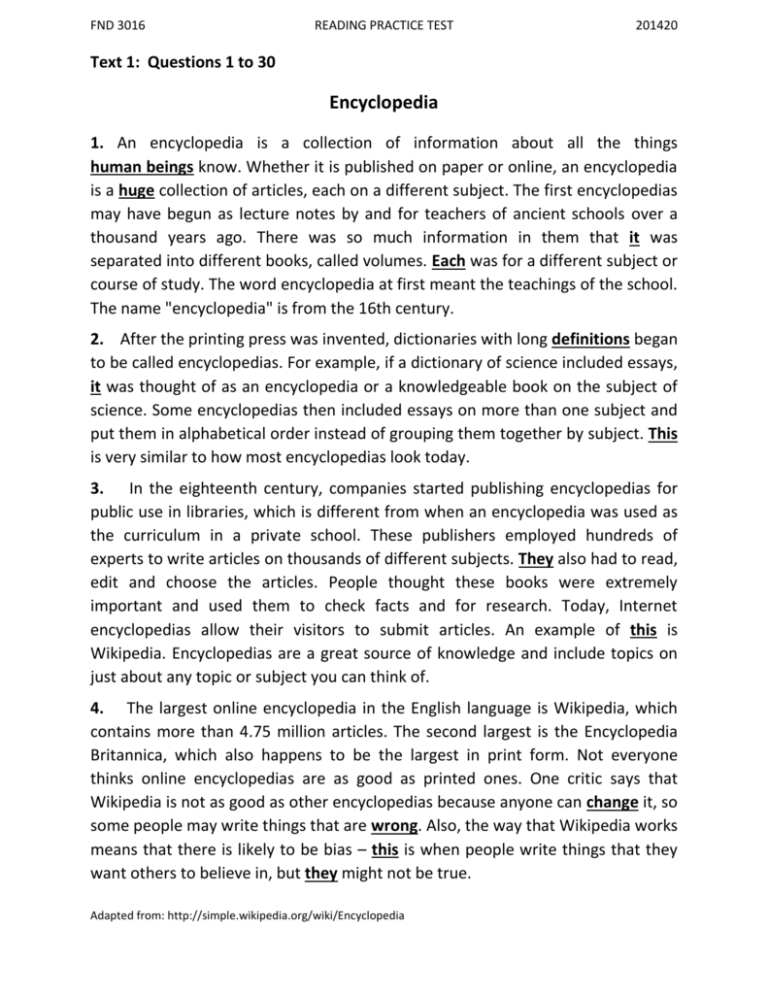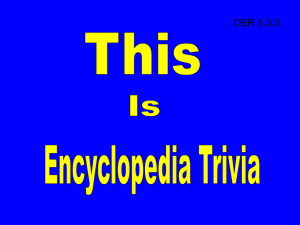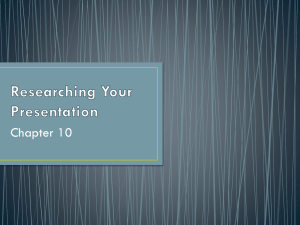Text 1: Encyclopedia - Breaking News English
advertisement

FND 3016 READING PRACTICE TEST 201420 Text 1: Questions 1 to 30 Encyclopedia 1. An encyclopedia is a collection of information about all the things human beings know. Whether it is published on paper or online, an encyclopedia is a huge collection of articles, each on a different subject. The first encyclopedias may have begun as lecture notes by and for teachers of ancient schools over a thousand years ago. There was so much information in them that it was separated into different books, called volumes. Each was for a different subject or course of study. The word encyclopedia at first meant the teachings of the school. The name "encyclopedia" is from the 16th century. 2. After the printing press was invented, dictionaries with long definitions began to be called encyclopedias. For example, if a dictionary of science included essays, it was thought of as an encyclopedia or a knowledgeable book on the subject of science. Some encyclopedias then included essays on more than one subject and put them in alphabetical order instead of grouping them together by subject. This is very similar to how most encyclopedias look today. 3. In the eighteenth century, companies started publishing encyclopedias for public use in libraries, which is different from when an encyclopedia was used as the curriculum in a private school. These publishers employed hundreds of experts to write articles on thousands of different subjects. They also had to read, edit and choose the articles. People thought these books were extremely important and used them to check facts and for research. Today, Internet encyclopedias allow their visitors to submit articles. An example of this is Wikipedia. Encyclopedias are a great source of knowledge and include topics on just about any topic or subject you can think of. 4. The largest online encyclopedia in the English language is Wikipedia, which contains more than 4.75 million articles. The second largest is the Encyclopedia Britannica, which also happens to be the largest in print form. Not everyone thinks online encyclopedias are as good as printed ones. One critic says that Wikipedia is not as good as other encyclopedias because anyone can change it, so some people may write things that are wrong. Also, the way that Wikipedia works means that there is likely to be bias – this is when people write things that they want others to believe in, but they might not be true. Adapted from: http://simple.wikipedia.org/wiki/Encyclopedia FND 3016 READING PRACTICE TEST ID: _________________________ SECTION: __________ Read the text and answer the questions in BB Learn. Text 1: Encyclopedia 1. The words “human beings” in paragraph 1 are closest in meaning to: a. b. c. d. 2. The word “huge” in paragraph 1 is closest in meaning to: a. b. c. d. 3. Volumes Courses Lecture notes Teachings The word “each” in paragraph 1 refers to: a. b. c. d. 7. Book Subject Information Study The different books that are part of a set of encyclopedia are called _____. a. b. c. d. 6. True False Not Given The word “it” in paragraph 1 refers to: a. b. c. d. 5. Very big Hold Tiny Old The first encyclopedias were published in the year 1015. a. b. c. 4. Collections Books People Subjects Teacher Encyclopedia Article Volume What is from the 16th century? a. b. c. d. Books The word ‘encyclopedia’ Teachings of the school A year 201420 FND 3016 8. The main idea of paragraph 1 is _____. a. b. c. d. 9. READING PRACTICE TEST To tell us the history of the word encyclopedia To explain how encyclopedias first started To encourage us to use encyclopedias more To describe the different subjects in encyclopedias Some dictionaries started to be called encyclopedias after the printing press was invented. a. b. c. True False Not Given 10. The word “definitions” in paragraph 2 is closest in meaning to: a. b. c. d. Meanings Nouns Words Vocabularies 11. The word “it” in paragraph 2 refers to: a. b. c. d. Knowledge An essay A dictionary Science 12. Some encyclopedias were arranged in an A-Z format. a. b. c. True False Not Given 13. Some encyclopedias put essays in alphabetical order and not by _____. a. b. c. d. Alphabet Letter Dictionary Subject 14. The word “this” in paragraph 2 refers to: a. b. c. d. Knowledge Grouping essays by subject What happens today Putting essays in alphabetical order 15. The main idea of paragraph 2 is _____. a. b. c. d. To describe how encyclopedia essays began to be arranged alphabetically Give some background information on the printing press Discuss the advantages of grouping by subject Describe what encyclopedias look like nowadays 201420 FND 3016 READING PRACTICE TEST 16. The word “started” in paragraph 3 is closest in meaning to: a. b. c. d. Researched Said Began Printed 17. From the 18th century, people could use encyclopedias in ______. a. b. c. d. Public A library Companies Universities 18. How many different subjects did people write about? a. b. c. d. Hundreds of thousands Hundreds Thousands 100,000 19. The word “they” in paragraph 3 refers to: a. b. c. d. Experts Employers Libraries People 20. The word “this” in paragraph 3 refers to: a. b. c. d. Great sources of knowledge Checking facts for research Letting people send articles to online encyclopedias The Internet 21. There is pretty much an encyclopedia topic on anything you can think of. a. b. c. True False Not Given 22. The main idea of paragraph 3 is _____. a. b. c. d. Highlight the differences between online encyclopedias in the past and today To inform people that encyclopedias are good for checking facts Explain how to become a writer for an encyclopedia Say how encyclopedias changed from the 18th century to today 23. Wikipedia is the largest paper-based encyclopedia in English. a. b. c. True False Not Given 201420 FND 3016 READING PRACTICE TEST 201420 24. Wikipedia has ______ articles in its encyclopedia. a. b. c. d. Exactly 4.75 million Fewer than 4.75 million Around 4.75 million Over 4.75 million 25. The word “change” in paragraph 4 is closest in meaning to: a. b. c. d. Edit Chance Mistake Damage 26. The word “wrong” in paragraph 4 is closest in meaning to: a. b. c. d. Mistaken Out Right Incorrect 27. On Wikipedia, it is probably right to say that a. b. c. d. Everything is true Most things are true Less than half of what is written is true Almost nothing is true 28. The word “this” in paragraph 4 refers to: a. b. c. d. Likely Bias Things Wikipedia 29. The word “they” in paragraph 4 refers to: a. b. c. d. People Things people write about Bias Others who don’t believe things 30. The main idea of paragraph 4 is _____. a. b. c. d. To tell people that printed encyclopedias are better than online encyclopedias To talk about online encyclopedias and a problem they have To encourage people to change online encyclopedias To compare Encyclopedia Britannica and Wikipedia FND 3016 READING PRACTICE TEST Text 1: Encyclopedia - Answers 1. The words “human beings” in paragraph 1 are closest in meaning to: a. Collections b. Books *c. People d. Subjects 2. The word “huge” in paragraph 1 is closest in meaning to: *a. Very big b. Hold c. Tiny d. Old 3. The first encyclopedias were published in the year 1015. a. True b. False *c. Not Given 4. The word “it” in paragraph 1 refers to: a. Book b. Subject *c. Information d. Study 5. The different books that are part of a set of encyclopedia are called _____. *a. Volumes b. Courses c. Lecture notes d. Teachings 6. The word “each” in paragraph 1 refers to: a. Teacher b. Encyclopedia c. Article *d. Volume 7. What is from the 16th century? a. Books *b. The word ‘encyclopedia’ c. Teachings of the school d. A year 8. The main idea of paragraph 1 is _____. a. To tell us the history of the word encyclopedia *b. To explain how encyclopedias first started c. To encourage us to use encyclopedias more d. To describe the different subjects in encyclopedias 201420 FND 3016 READING PRACTICE TEST 201420 9. Some dictionaries started to be called encyclopedias after the printing press was invented. *a. True b. False c. Not Given 10. The word “definitions” in paragraph 2 is closest in meaning to: *a. Meanings b. Nouns c. Words d. Vocabularies 11. The word “it” in paragraph 2 refers to: a. Knowledge b. An essay *c. A dictionary d. Science 12. Some encyclopedias were arranged in an A-Z format. *a. True b. False c. Not Given 13. Some encyclopedias put essays in alphabetical order and not by _____. a. Alphabet b. Letter c. Dictionary *d. Subject 14. The word “this” in paragraph 2 refers to: a. Knowledge b. Grouping essays by subject c. What happens today *d. Putting essays in alphabetical order 15. The main idea of paragraph 2 is _____. *a. To describe how encyclopedia essays began to be arranged alphabetically b. Give some background information on the printing press c. Discuss the advantages of grouping by subject d. Describe what encyclopedias look like nowadays 16. The word “started” in paragraph 3 is closest in meaning to: a. Researched b. Said *c. Began d. Printed 17. From the 18th century, people could use encyclopedias in ______. a. Public *b. A library FND 3016 READING PRACTICE TEST c. Companies d. Universities 18. How many different subjects did people write about? a. Hundreds of thousands b. Hundreds *c. Thousands d. 100,000 19. The word “they” in paragraph 3 refers to: *a. Experts b. Employers c. Libraries d. People 20. The word “this” in paragraph 3 refers to: a. Great sources of knowledge b. Checking facts for research *c. Letting people send articles to online encyclopedias d. The Internet 21. There is pretty much an encyclopedia topic on anything you can think of. *a. True b. False c. Not Given 22. The main idea of paragraph 3 is _____. a. Highlight the differences between online encyclopedias in the past and today b. To inform people that encyclopedias are good for checking facts c. Explain how to become a writer for an encyclopedia *d. Say how encyclopedias changed from the 18th century to today 23. Wikipedia is the largest paper-based encyclopedia in English. a. True *b. False c. Not Given 24. Wikipedia has ______ articles in its encyclopedia. a. Exactly 4.75 million b. Fewer than 4.75 million c. Around 4.75 million *d. Over 4.75 million 25. The word “change” in paragraph 4 is closest in meaning to: *a. Edit b. Chance c. Mistake d. Damage 201420 FND 3016 READING PRACTICE TEST 26. The word “wrong” in paragraph 4 is closest in meaning to: a. Mistaken b. Out c. Right *d. Incorrect 27. On Wikipedia, it is probably right to say that a. Everything is true *b. Most things are true c. Less than half of what is written is true d. Almost nothing is true 28. The word “this” in paragraph 4 refers to: a. Likely *b. Bias c. Things d. Wikipedia 29. The word “they” in paragraph 4 refers to: a. People *b. Things people write about c. Bias d. Others who don’t believe things 30. The main idea of paragraph 4 is _____. a. To tell people that printed encyclopedias are better than online encyclopedias *b. To talk about online encyclopedias and a problem they have c. To encourage people to change online encyclopedias d. To compare Encyclopedia Britannica and Wikipedia 201420






